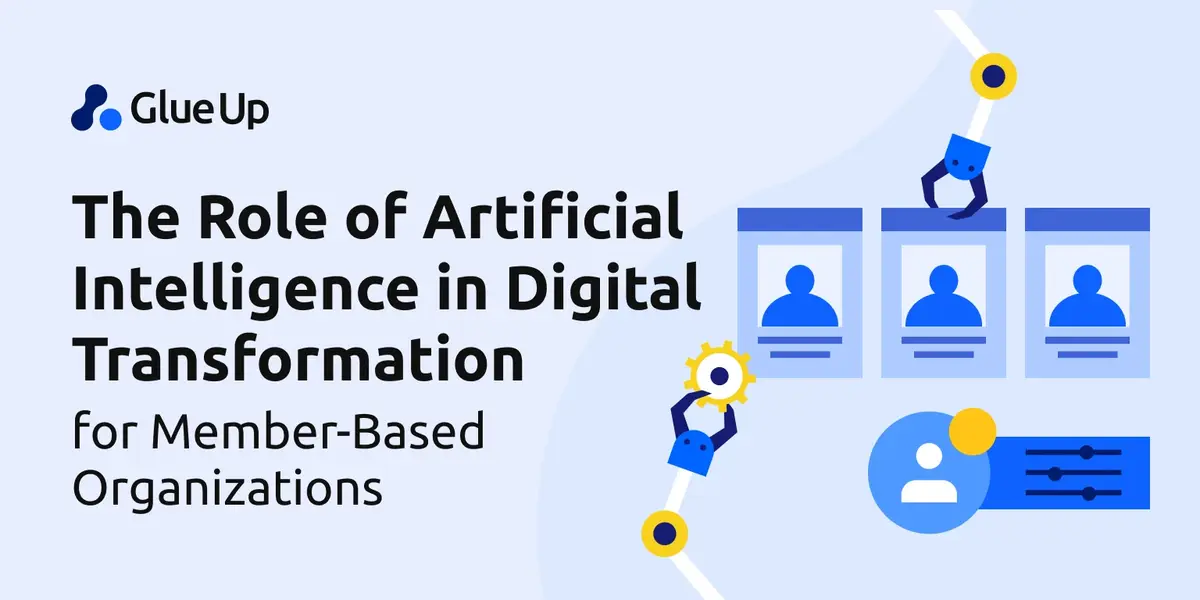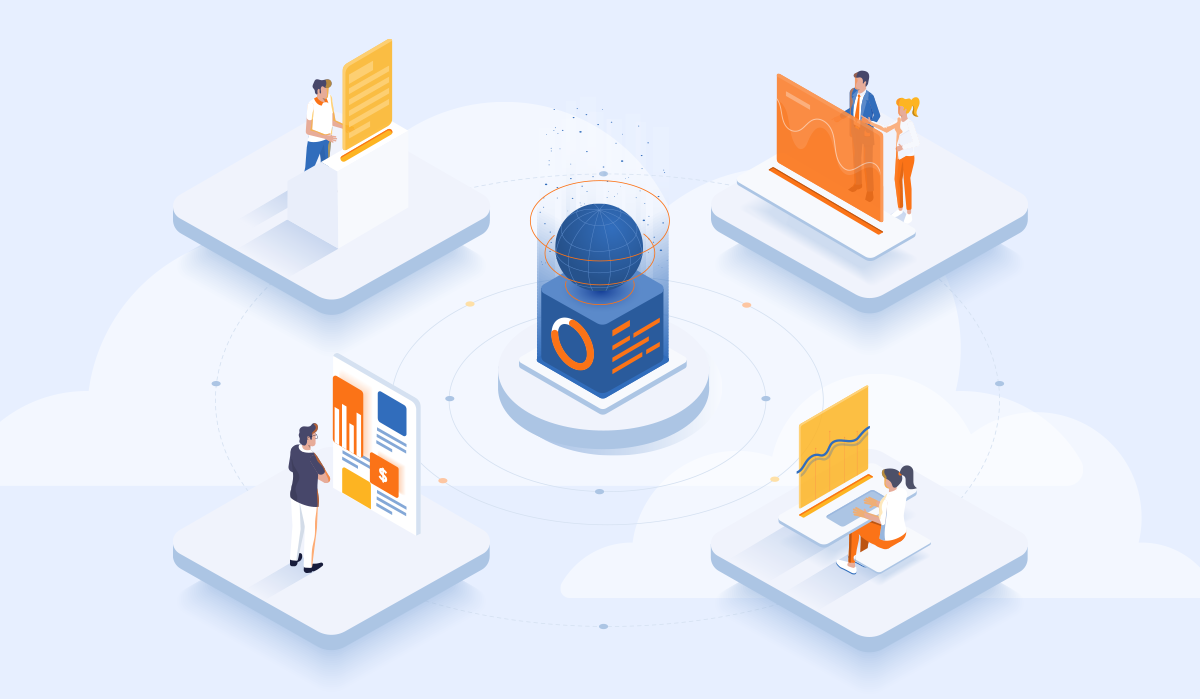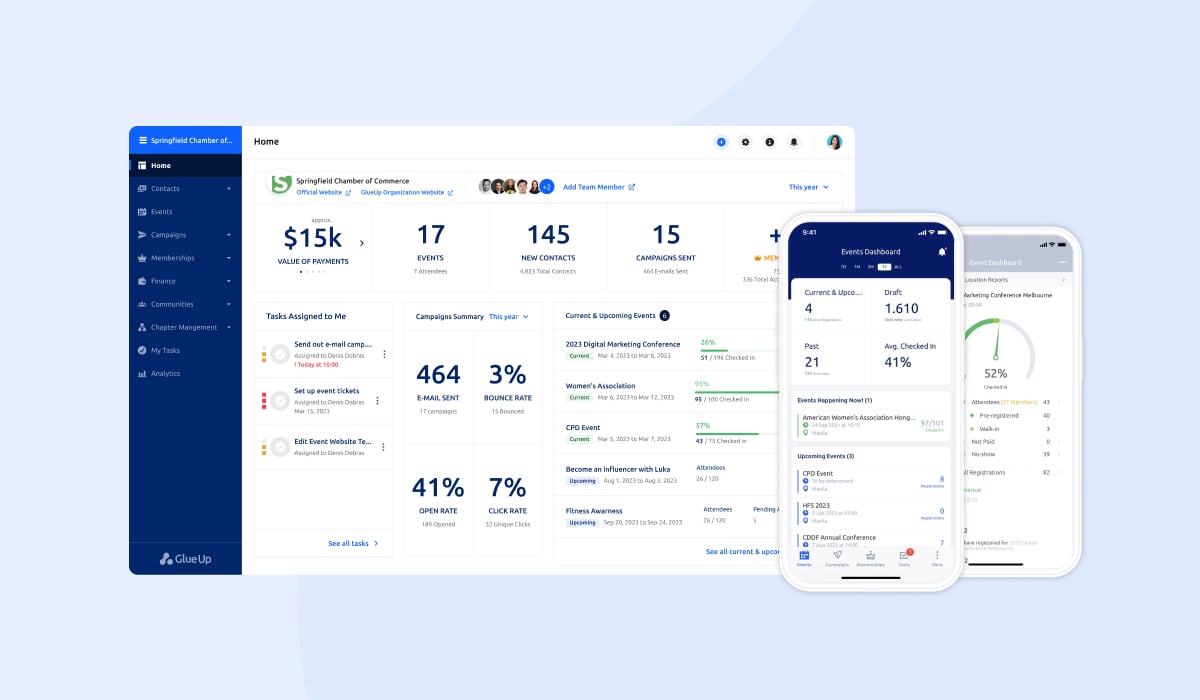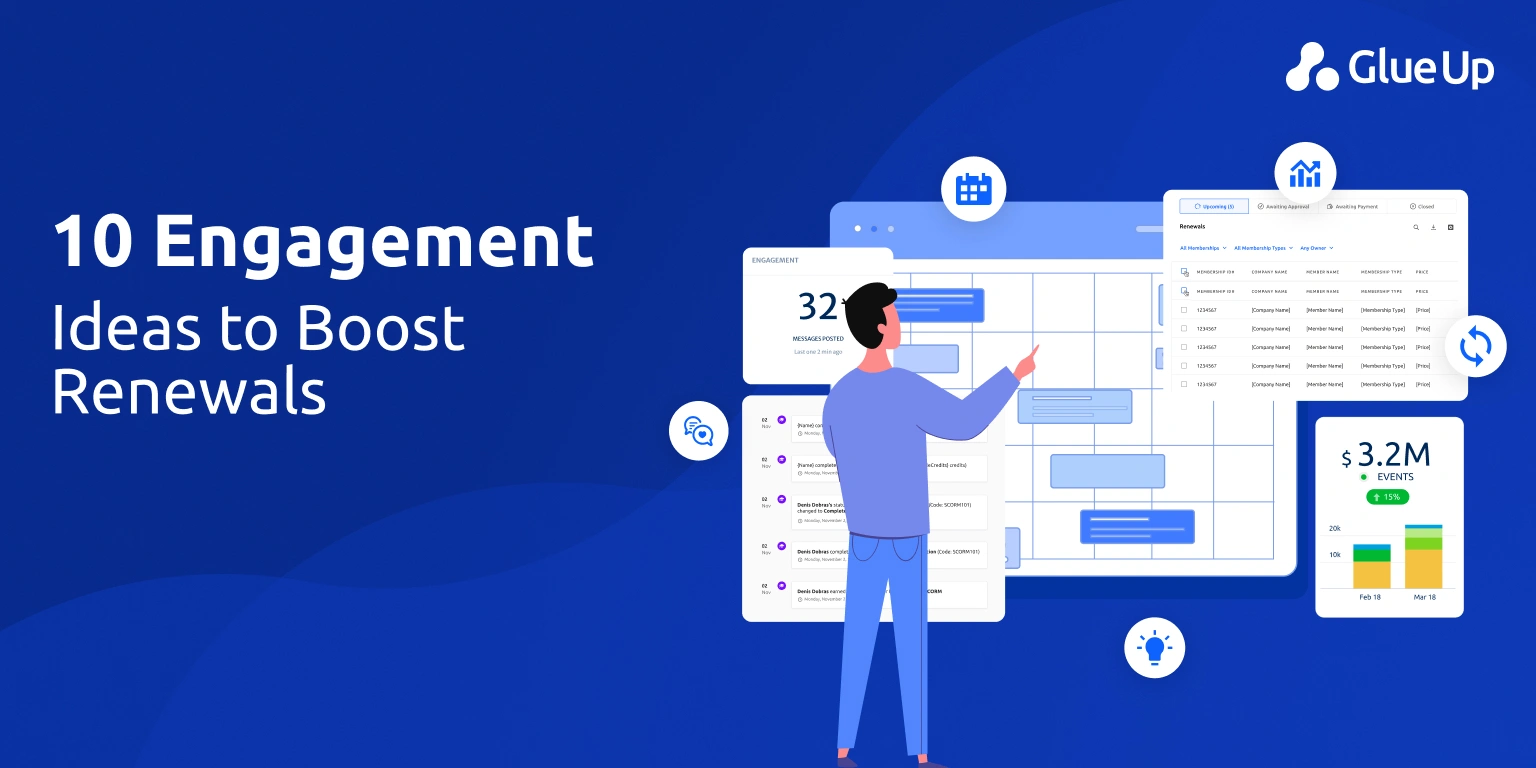
Last Updated: March 15, 2024
Artificial intelligence is one of the core technologies in digital transformation that is helping businesses scale up. In fact, according to the latest report by Research and Markets, AI is expected to achieve a compound annual growth rate of 52% by 2025, indicating its rapid adoption by global businesses.
AI is now being integrated into and deployed across a variety of sectors, such as national security, healthcare, logistics, and education. Let’s see how it's helping member-based organizations in accelerating their journey of digital transformation.
Key Takeaways
Artificial intelligence is a pivotal technology in digital transformation, enabling businesses to scale and innovate.
AI and machine learning are leveraged by digital transformation platforms to analyze social, historical, and behavioral data, providing a comprehensive 360-degree view of members' needs.
AI technologies enable hyper-personalization, allowing organizations to create detailed audience personas and make personalized recommendations.
Glue Up's digital transformation platform automates membership management processes, helping organizations save time and resources.
Glue Up AI Copilot is the first-ever AI-based SaaS community platform that empowers to effortlessly produce engaging events, surveys, and campaign descriptions.
What Is Artificial Intelligence (AI)?

Artificial intelligence is the ability of computers and machines to mimic the functions of the human brain. Typically, AI refers to the process of developing systems with the capabilities of human intelligence, such as the ability to learn from past experiences, reason, discover meaning, and generalize.
The four main types of Artificial Intelligence include reactive machines, limited memory, theory of mind, and self-awareness. They together enable technologies such as Natural Language Processing (NLP), computer vision, facial recognition, machine learning, and deep learning.
Most AIs with machine learning work as assistive technology, recommending the best actions to the organizations. As a result, they can maximize revenues, personalize processes, make accurate use of data, and provide better customer service.
How Can AI Help Organizations Accelerate Digital Transformation?
Artificial intelligence (AI) is a driving force behind digital transformation, encompassing innovations such as machine learning, natural language processing (NLP), data labeling platforms and predictive analytics.
As a result of these technologies, organizations can analyze data to anticipate the future and suggest the most effective strategies.
By using AI-driven automation, service providers can deliver reliable services with 24/7 support through chatbots. In addition, smart data analytics can personalize interactions, optimize workflows, and reduce support costs.
With AI's ability to learn and improve with more data, it can also assist organizations in developing successful digital transformation roadmaps.
How Is Artificial Intelligence Different from Automation?
While AI and automation may seem similar, they are fairly different terms.
An automated program follows pre-programmed rules to carry out tasks without the intervention of a human. The purpose of automation is to save time and money spent on repetitive, voluminous tasks, thus allowing employees to work on more complex tasks.
Artificial Intelligence (AI), on the other hand, simulates human thought processes. It analyzes a large amount of data to learn and recommend what’s best for the organization. The process works seamlessly due to the ML model training and activation functions in the background.
Though most of the automation occurs with traditional software, in some cases, it uses artificial intelligence along with other digital transformation technologies in the process called AI automation.
Using this powerful digital technology, business processes can benefit from automation i.e. increasing speed, and efficiency, saving time with the insights, flexibility, and processing power of artificial intelligence.
AI automation in associations can play a crucial role in keeping their members happy and satisfied. It provides first-hand knowledge of what your members want, what attracts their interest, and how you can improve.
Benefits of Digital Transformation Coupled With AI for Member-Based Organizations
Digital AI is being used in many ways by organizations to innovate, improve, and scale up. Let’s see how AI is making a positive impact on member-based organizations and helping them accelerate their digital transformation.
360-Degree View of Members' Needs and Satisfaction

Member-based organizations can gain a much more accurate understanding of their customers by combining AI and machine learning for analyzing social, historical, and behavioral data. Several digital transformation platforms use AI to offer a 360-degree view of members' needs based on their browsing history, EDM analysis, and click-through rates.
Unlike traditional data analytics software, AI constantly learns from the data it analyses, anticipating customer behavior from it. By doing so, brands can create valuable content, boost revenue, and enhance customer experiences.
It is difficult for companies to predict which marketing technique will work best without AI. Organizations can develop much more accurate members’ profiles by using Big Data and AI analytics.
The AI algorithms that track the behaviors and interactions of each customer further assist in determining which marketing strategies work best. These algorithms also optimize advertising campaigns, set the right pricing strategies, and drive more memberships.
Profitable Growth

Digitalization has enabled organizations to grow and generate revenue using advancements in Artificial intelligence. The use of AI increases revenue in various ways for any company. For instance, it allows businesses to detect very weak areas and generate accurate predictions about prospects, competitors, and market trends.
More importantly, AI is extremely fast and automatically analyzes a vast amount of data in real-time to help improve decision-making.
Effective Decision-Making
AI makes processes efficient and smooth while providing managers with critical information that can assist them in making informed decisions. As a result, they can rethink how they integrate information, analyze data, and use the resulting insights.
Once the AI solution is implemented in the operations, it starts processing data and analyzing the trend to identify the best course of action which appear in the form of suggestions. AI becomes more accurate over time, as you feed more data to it. Once the AI has analyzed data for months, it can make accurate predictions.
AI can help member-based organizations in understanding their customers and tailor their membership marketing strategies accordingly. It analyzes the CRM data to segment members by demographics and similar interests. It can also suggest improvements in the membership processes based on the feedback and experiences of the current members for retention and engagement.
All in all, making decisions with AI is far more accurate than making decisions by humans, free of emotions and biases. Moreover, computers can execute complex decisions quickly, something that would take humans months to accomplish.
Improved Productivity
Automating specific manual tasks through Artificial Intelligence enables organizations to become more productive. This is verified by several studies that show that AI increases productivity by 40% or more.
Artificial intelligence can increase productivity in several ways. They are able to crawl and collect information quickly, saving employees time so they can focus on their core missions. Additionally, they can perform complex calculations, identify patterns, and automate routine tasks, giving organizations a competitive edge in gaining insights to make informed decisions.
Furthermore, AI has revolutionized communication within and outside of organizations by generating email content, event summaries, and other forms of engagement communications.
By leveraging natural language processing, AI can draft emails that are contextually relevant and tailored to the recipient, thus reducing the time spent on drafting correspondences. It can also summarize key points from meetings and events, ensuring efficient information dissemination and record-keeping.
This not only enhances internal communication but also fosters stronger client relationships through personalized and timely interactions, further boosting productivity and efficiency.
Exceptional Customer Service

Efficient customer service requires employees to have back and forth conversations with members and prospects, which is often time-consuming and requires a lot of effort. In many cases, artificial intelligence can handle low-level communication steps, reducing employee stress.
Chatbots, for instance, can handle the initial steps of customer support like gathering their name, account information, and the type of support they need. This information is then relayed to a human representative, who can take over from there if needed.
Enhanced Members’ Experience
According to a Forbes report, 75% of the businesses that use AI systems can enhance customer satisfaction by more than 10%.
Using AI-driven qualitative methods can help member-based associations identify what they are missing and what their customers want. Members' data can be extracted directly from their accounts (interests, engagement, and retention rates) or via questionnaires and surveys.
In conjunction with data analytics, it also provides access to real-time user data. In this way, they can keep up with the changes in their behavior and expectations and offer highly relevant content to improve their members’ journey.
Increased Members’ Trust and Loyalty
Using Artificial Intelligence, businesses can offer hyper-personalized content and a comprehensive marketing strategy aimed at retaining members through long-lasting relationships.
The predictive analysis through AI processes members’ data to provide valuable insights. These insights enable them to know the pain points and retain them with effective strategies.
Using data-based loyalty programs through AI, organizations can create audience personas for their businesses based on interests and other factors. The AI transformation technologies are also used to make personalized recommendations to members and to engage them through conversational bots.
All these transformative AI initiatives make them feel heard, which in turn increases their trust and loyalty to the organization.
Personalized Skill Training

With the use of AI in member-based organizations, employees can learn new skills according to their capabilities, understanding, and intelligence. An AI-powered training program can be tailored to the needs of each employee by modifying the modules. For instance, certain employees might receive video tutorials through the LMS, but others might receive text-based articles, depending on their needs.
AI offers a personalized learning path based on individual learning styles and progress. It involves video tutorials, written materials, gamification, audio-guided presentations, or live training.
Insights gained through AI are also useful in developing predictive capabilities since they can reveal learner behavior more deeply. Organizations can utilize the insights to develop content that is relevant, engaging, and tailored to each employee’s needs.
How AI Works With the Cloud to Empower Digital Transformation?
The cloud AI market share is anticipated to grow to USD 10.22 billion by 2026, indicating a significant shift by organizations towards this technology. This shift from traditional data storage methods to cloud technology is gaining momentum, powered by the cloud's capacity to access large datasets essential for AI's functionality.
The collaboration between AI and cloud technology enables businesses to leverage the full potential of AI's predictive analytics and pattern detection capabilities on an unprecedented scale.
Cloud technology offers the scalable infrastructure and computational power for AI algorithms to process data efficiently. This combination allows organizations to gain deeper insights, improve decision-making, and enhance operational efficiency.
AI can analyze cloud-stored data to identify trends, predict future outcomes, and uncover hidden patterns, facilitating more informed strategic planning and innovation.
The convergence of AI with cloud technology transforms how businesses operate and drives significant growth in the cloud AI market. Due to the rapid adoption of cloud technology and the increasing reliance on AI for data analytics and automation, the market is already set for exponential growth.
How Is Glue Up Helping Membership Organizations with Digital Transformation?
Glue Up is the first-ever AI-based community software that helps membership organizations build long-lasting relationships with their members. The ecosystem modules cover every aspect of these organizations, leveraging their strengths as well as providing excellent user experience to their members.
Additionally, the Glue Up AI Copilot acts as an intelligent writing assistant, enabling organizations to generate compelling event titles, subtitles, SEO descriptions, summaries, survey descriptions, and campaign text blocks with ease.
Last but not the least, Glue Up has joined NVIDIA Inception program to boost innovation in how organizations use AI! This partnership empowers us to develop next-gen solutions for Associations, Chambers and Membership Organizations.
Book a demo today to discover how Glue Up AI Copilot can transform your member engagement and support your digital transformation journey.
For Member-Based Organizations
Glue Up’s digital transformation platform automates all the membership management processes to retain as well as grow your members’ community. It helps you save time and money so that you can focus on your core mission i.e. providing a premium experience to your members.

The membership management module helps you get members effortlessly through custom application forms, a user-friendly interface, and several membership types. The platform automatically synchronizes information from the moment an application is created.
From there, you can create events using the drag-and-drop model, send email campaigns, and collect payments. The platform also helps in retaining your members by automating the membership renewal process. The membership renewal workflows detect outstanding payments and send renewal reminders through automated emails and push notifications.
Also, being the first AI-based SaaS software for communities, Glue Up AI Copilot, enables you to manage your members and foster strong relationships with them using a single solution.
By simply providing your project details, you can use the AI Copilot to create content tailored to your needs, which can be further refined or dismissed based on your satisfaction.
For Members
Glue Up offers a customer-centric approach, giving your members a digital place to connect and create long-lasting business relationships. Members can easily sign up from the seamless UI integrated into your website.
As soon as they sign up, they can access a professional digital community through My Glue Community, where they can engage in 1-on-1 chats and exchange business cards. In addition, they can share events, post updates, or create groups with other members, forming meaningful connections.
Organizations Driving Digital Transformation With Glue Up - Success Stories
ITE Met Section Going Paperless With Glue Up
ITE Metropolitan Section of New York and New Jersey in the United States needed a solution for running their events more efficiently. They were looking for software that would reduce their paperwork and allow them to retrieve more data so that they could evaluate the success of their events and improve future ones.
After integrating Glue Up into its events strategy, the ITE Met Section noticed commendable improvements to their check-in process, time-saving, and data quality.
Along with getting rid of time-consuming paperwork, Glue Up also helped the ITE Met Section in other ways. ITE Met Section was able to compile pre and post-meeting reports within its system where they could be tracked and easily followed up with event attendees. Glue Up's drag-and-drop dashboards also made ITE Met Section's data analysis dynamic and interactive.
Instead of spending hours on paperwork, ITE is now are now able to analyze data generated by the Glue Up platform to get a broader view of the success of an event. Aside from helping them with time-consuming paperwork, Glue Up provides them with tools such as CRMs and Emails to streamline their processes.
ALE Association Automating Processes With Glue Up’s Association CRM
ALE Association is a philanthropic organization that aims to give access to health care and good quality of life to the less fortunate.
The association simplified several of its manual tasks by implementing Glue Up software. From creating events to sending mass invitations, they can manage all their membership tasks seamlessly.
Aside from tracking who receives an invitation, they can also see who opens it by using Glue Up's analytics.
What Is the Future of AI in Digital Transformation?
The future of AI in digital transformation promises a new era of technological evolution, promising profound changes across all sectors. As we stand on the brink of this revolution, several key areas emerge as central to AI's role in shaping the digital future.
Deeper Automation and Efficiency
AI is set to drive deeper automation, transcending traditional operational boundaries to automate complex decision-making processes. This evolution will enhance efficiency and redefine what tasks can be automated.
By utilizing AI, businesses can streamline workflows, reduce manual errors, and free up human talent for strategic thinking and creativity, thereby significantly boosting productivity.
Enhanced Decision-Making
Enhanced predictive analytics and machine learning models will provide unprecedented accuracy in insights to organizations, helping them make informed decisions swiftly. However, AI will play an important role in these organizations, as it can analyze vast datasets beyond human capability.
This capability will be instrumental in navigating the uncertainties of market dynamics, consumer behaviors, and emerging trends, ensuring agility and competitiveness.
Hyper-Personalized Experiences
AI's capacity for data analysis will enable the creation of hyper-personalized experiences, marking a shift towards more customer-centric strategies.
By understanding individual preferences, behaviors, and needs, AI can tailor products, services, and communications to each user, enhancing satisfaction and loyalty. This level of personalization will be a key differentiator in the digital marketplace, redefining customer expectations and engagement.
AI-Driven Innovation
AI-powered innovation will disrupt industries, creating new business models, products, and services. AI's ability to learn, adapt, and generate creative solutions will open up new avenues for innovation, driving growth and transformation.
Organizations harnessing AI-driven innovation will lead their sectors, setting new standards and reimagining possible outcomes.
Focus on Ethics and Security
AI has become more integrated into daily operations, decision-making, ethical considerations, and security, and security concerns will now emerge. The future of AI in digital transformation will emphasize the development of ethical AI frameworks that ensure fairness, transparency, and accountability.
Moreover, as AI systems handle increasingly sensitive data, robust security measures will be paramount to protect against breaches and ensure data integrity.
In conclusion, the future of AI in digital transformation is bright, offering endless possibilities for automation, efficiency, decision-making, personalization, and innovation.
However, realizing this potential will require a balanced approach that addresses the ethical and security challenges posed by AI. As we move forward, the focus will be on harnessing AI's power responsibly to shape a future where technology enhances human capabilities and drives societal progress.


